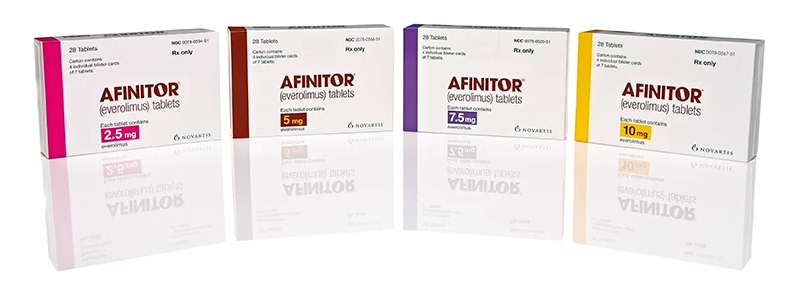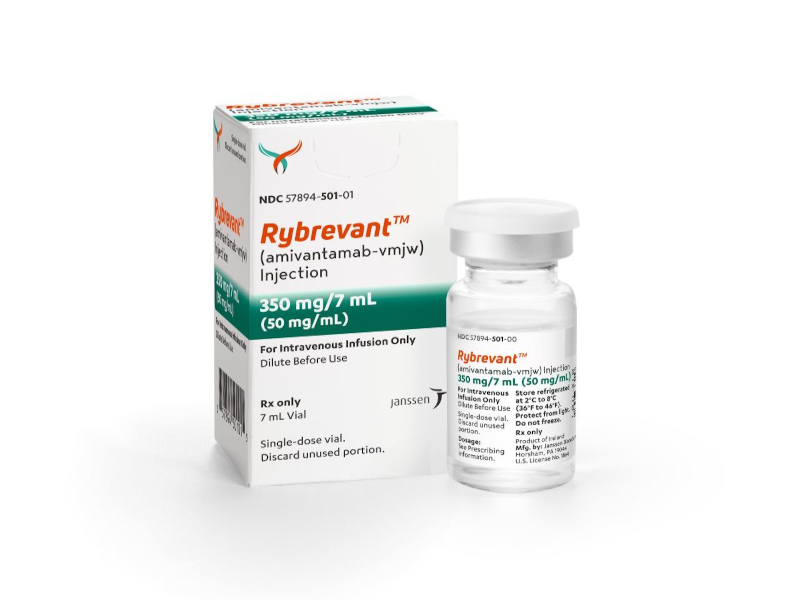Afinitor (everolimus) vs Rybrevant (amivantamab-vmjw)
Afinitor (everolimus) vs Rybrevant (amivantamab-vmjw)
Afinitor (everolimus) is an mTOR inhibitor used to treat various types of cancer, including advanced renal cell carcinoma, certain breast cancers, and neuroendocrine tumors, among others; it works by interfering with cellular growth and proliferation. Rybrevant (amivantamab-vmjw) is a bispecific antibody targeting EGFR and MET receptors and is used for the treatment of non-small cell lung cancer (NSCLC) with specific EGFR exon 20 insertion mutations. When deciding between these medications, it is crucial to consider the specific type of cancer and its genetic profile, as Afinitor and Rybrevant are tailored to target different pathways and mutations, and a healthcare provider would recommend the appropriate therapy based on the individual's cancer diagnosis and molecular testing results.
Difference between Afinitor and Rybrevant
| Metric | Afinitor (everolimus) | Rybrevant (amivantamab-vmjw) |
|---|---|---|
| Generic name | Everolimus | Amivantamab-vmjw |
| Indications | Advanced hormone receptor-positive, HER2-negative breast cancer, advanced neuroendocrine tumors, renal cell carcinoma, subependymal giant cell astrocytoma (SEGA), tuberous sclerosis complex (TSC)-associated partial-onset seizures, TSC-associated renal angiomyolipoma | Non-small cell lung cancer (NSCLC) with specific genetic mutations (EGFR exon 20 insertion mutations) |
| Mechanism of action | mTOR inhibitor | Bispecific antibody targeting EGFR and MET receptors |
| Brand names | Afinitor, Afinitor Disperz, Votubia | Rybrevant |
| Administrative route | Oral | Intravenous |
| Side effects | Mouth ulcers, infections, rash, fatigue, diarrhea, edema, abdominal pain, nausea, fever, pneumonitis | Infusion-related reactions, skin rash, paronychia, musculoskeletal pain, dyspnea, nausea, edema, stomatitis, vomiting, fatigue |
| Contraindications | Hypersensitivity to everolimus or other rapamycin derivatives | Hypersensitivity to amivantamab-vmjw or any of its excipients |
| Drug class | Antineoplastic agent, mTOR kinase inhibitor | Antineoplastic agent, bispecific antibody |
| Manufacturer | Novartis | Janssen Biotech, Inc. |
Efficacy
Efficacy of Afinitor (Everolimus) in Lung Cancer
Afinitor (everolimus) is a medication known primarily for its use in certain types of cancers and tumors. In the context of lung cancer, everolimus has been studied for its efficacy in treating non-small cell lung cancer (NSCLC), particularly in patients who have progressed after treatment with other therapies. Everolimus works by inhibiting the mammalian target of rapamycin (mTOR), a protein that plays a critical role in cell proliferation and angiogenesis. This inhibition can slow down or stop the growth of cancer cells.
While everolimus is not primarily indicated for the first-line treatment of lung cancer, it may be considered in certain clinical scenarios. Clinical trials have shown that everolimus can provide a benefit in terms of progression-free survival in patients with advanced NSCLC who have previously been treated with chemotherapy. However, the overall survival benefit may be limited, and the use of everolimus in lung cancer should be based on an individual patient's disease characteristics and previous treatment responses.
Efficacy of Rybrevant (Amivantamab-vmjw) in Lung Cancer
Rybrevant (amivantamab-vmjw) is a relatively new therapeutic agent approved for the treatment of adult patients with non-small cell lung cancer (NSCLC) with specific genetic alterations. Specifically, it is indicated for NSCLC patients with epidermal growth factor receptor (EGFR) exon 20 insertion mutations whose disease has progressed on or after platinum-based chemotherapy. Amivantamab-vmjw is a bispecific antibody that targets both the EGFR and MET receptors, which are involved in the growth and spread of cancer cells.
The efficacy of Rybrevant has been demonstrated in clinical trials, where it has shown promising response rates in patients with the aforementioned EGFR mutations. The response to treatment with Rybrevant is often rapid, and a significant number of patients experience a reduction in tumor size. The duration of response and overall survival data are still being collected, but the initial findings suggest that Rybrevant provides a new therapeutic option for a subset of patients with difficult-to-treat NSCLC. It is important to note that the presence of EGFR exon 20 insertion mutations should be confirmed by an FDA-approved test prior to starting treatment with Rybrevant.
Regulatory Agency Approvals
Afinitor
-
European Medical Agency (EMA), European Union

-
Food and Drug Administration (FDA), USA

-
Health Canada

-
Pharmaceuticals and Medical Devices Agency (PMDA), Japan

-
Therapeutic Goods Administration (TGA), Australia

Rybrevant
-
European Medical Agency (EMA), European Union

-
Food and Drug Administration (FDA), USA

Access Afinitor or Rybrevant today
If Afinitor or Rybrevant are not approved or available in your country (e.g. due to supply issues), you can access them via Everyone.org.
How it works

Make an enquiry
Choose the medicine you want to buy, answer a couple of questions, and upload your prescription to speed things up. We’ll get back to you within 24 hours.


Make an enquiry
Choose the medicine you want to buy, answer a couple of questions, and upload your prescription to speed things up. We’ll get back to you within 24 hours.


Breeze through the paperwork
We'll guide you through the required documents for importing unapproved medicine, ensuring you have all the necessary information.


Get a personalized quote
We’ll prepare a quote for you, including medicine costs and any shipping, administrative, or import fees that may apply.


Receive your medicine
Accept the quote and we’ll handle the rest - sourcing and safely delivering your medicine.

Some text on this page has been automatically generated. Speak to your physician before you start a new treatment or medication.
Let's talk
If you have any questions, call us or send us a message through WhatsApp or email:
Contact us




